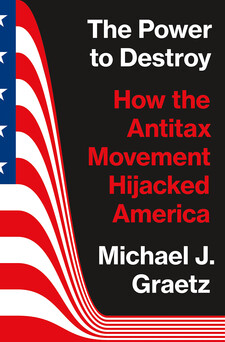No New Taxes

In his book The Power to Destroy: How the Antitax Movement Hijacked America (Princeton University Press, 2024), Michael J. Graetz argues that resistance to taxes has corroded U.S. politics far more than is often assumed.

Graetz, the Justus S. Hotchkiss Professor Emeritus of Law at Yale Law School, writes that the campaign to curtail taxation has, for nearly 50 years, secured success by trafficking in racist tropes, stoking cultural flashpoints, and promoting questionable economics.
“The modern antitax movement is the most overlooked social and political movement in recent American history,” Graetz writes. The movement’s costs, he continues, eclipse the limited scrutiny it has received. Graetz finds that antitax fervor has exacerbated inequality, hampering the government’s ability to provide social services and navigate times of crisis.
Graetz notes that antitax sentiment in the United States is hardly new.
“Resistance to taxes in the United States,” he writes, “has a long pedigree: it is as American as apple pie and fried catfish.” The Power to Destroy takes its title from Chief Justice John Marshall’s statement in McCulloch v. Maryland, a landmark 1819 Supreme Court case that addressed disputes over federal and state taxation, that the power to tax involves “the power to destroy.” But while taxes have long been contested, Graetz argues that they only recently became a cudgel that would fracture the nation.
To chronicle how the antitax movement amassed its influence, Graetz begins in 1978, the year that California voters amended the state’s constitution to curb any increase in property taxes. Proposition 13, as the measure was known, proved to be a watershed, spurring political operatives nationwide to seize on taxation. “The time was ripe for an antitax movement,” Graetz observes. As the U.S. struggled to contain stagflation, the demoralizing combination of recession and inflation, backlash against recent progress towards racial and gender equality exploded.

In tandem with the Republican Party’s infamous Southern strategy using racist rhetoric to increase political support, antitax activists argued that white taxpayers were being made to subsidize Black welfare recipients. From there, the notion that taxes threaten freedom went mainstream. “What started as an obsessive fringe movement to cut taxes, bolstered by spurious economic claims and camouflaged racist rhetoric,” Graetz concludes, “grew into a powerful force that transformed American politics and undermined the nation’s financial strength.”
Taxation, Graetz contends, offers a window into the nation’s values. “Contrary to common views,” he writes, “taxation is not solely about economics: cultural values are also at stake.” Noting that more Americans pay taxes than vote in presidential elections, Graetz considers what tax policies reveal about the public’s collective priorities and commitments. He argues that how the government levies taxes, and to what ends it uses them, are social and moral questions as much as economic and partisan ones.
In addition to his appointment at Yale Law School, Graetz is an Emeritus Professor of Law at Columbia Law School. Graetz’s previous books include The Wolf at the Door: Fighting Economic Insecurity, (with Ian Shapiro) (Harvard University Press, 2020); The Burger Court and the Rise of the Judicial Right (with Linda Greenhouse) (Simon & Schuster, 2016): The End of Energy: The Unmaking of America’s Environment, Security, and Independence (MIT Press, 2011); 100 Million Unnecessary Returns: A Simple, Fair, and Competitive Tax Plan for the United States (Yale University Press, 2008); and Death by a Thousand Cuts: The Fight over Taxing Inherited Wealth (with Ian Shapiro) (Princeton University Press, 2005).
Graetz has held a wide range of positions in public service, including as Assistant to the Secretary and Special Counsel at the U.S. Treasury Department. A fellow of the American Academy of Arts and Sciences, Graetz holds a B.B.A. from Emory University and a J.D. from the University of Virginia Law School.


